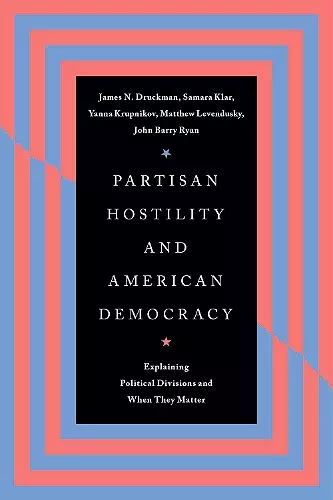Partisan Hostility and American Democracy
Explaining Political Divisions and When They Matter
James N Druckman author Yanna Krupnikov author John Barry Ryan author Samara Klar author Matthew Levendusky author
Format:Hardback
Publisher:The University of Chicago Press
Published:12th Jun '24
Currently unavailable, and unfortunately no date known when it will be back

An unflinching examination of the effects and boundaries of partisan animosity.
For generations, experts argued that American politics needed cohesive parties to function effectively. Now many fear that strong partisan views, particularly hostility to the opposing party, are damaging democracy. Is partisanship as dangerous as we fear it is?
To provide an answer, this book offers a nuanced evaluation of when and how partisan animosity matters in today’s highly charged, dynamic political environment, drawing on panel data from some of the most tumultuous years in recent American history, 2019 through 2021. The authors show that partisanship powerfully shapes political behaviors, but its effects are conditional, not constant. Instead, it is most powerful when politicians send clear signals and when an issue is unlikely to bring direct personal consequences. In the absence of these conditions, other factors often dominate decision-making.
The authors argue that while partisan hostility has degraded US politics—for example, politicizing previously non-political issues and undermining compromise—it is not in itself an existential threat. As their research shows, the future of American democracy depends on how politicians, more than ordinary voters, behave.
"This interesting and timely book empirically assesses the dangers presented to American democracy by partisan hostility or animosity and ideological polarization." * Choice *
"Partisan Hostility and American Democracy explores the degree to which hostility affects political beliefs and behaviors, promoting the view that while partisan animosity is unlikely to directly lead to democratic breakdown or collapse, it does have deleterious effects on democracy that could contribute to erosion over time." * Journal of Economic Literature *
“The growing divide between Democrats and Republicans has sparked hundreds of academic papers and books documenting the damaging effects of affective polarization on both the quality of governance and the social fabric of political life in the United States. In this abundance of literature, Partisan Hostility and American Democracy stands out. The authors provide a comprehensive and, more importantly, nuanced account of how the rise in partisan hostility—identity-driven divisions between the political parties—shapes Americans’ perceptions of the political world, including their support for public figures and policies, political compromise, as well as democratic norms and practices.” * Political Science Quarterly *
"Partisan Hostility and American Democracy [cites] studies on affective polarization showing that the gap between the positive feelings toward one’s own party and the negative feelings for the other party has grown in the past 20 years." * Perspectives on Political Science *
“Timely and rich, this is the best book yet written on partisan animosity in the United States. Harnessing impressive data, the authors convincingly show the powerful role of elected officials in magnifying tensions in the citizenry.” -- Sean J. Westwood | Dartmouth College
“Although there's been extensive documentation of the existence of partisan animosity and affective polarization, there's been little research attempting to understand whether this behavior affects democratic governance. Through extensive data collection and rigorous research design, the authors show that partisan animosity won't lead to immediate democratic collapse but instead can lead to long-term erosion of norms.” -- Neil Malhotra | Stanford University
ISBN: 9780226833651
Dimensions: 229mm x 152mm x 23mm
Weight: 481g
272 pages